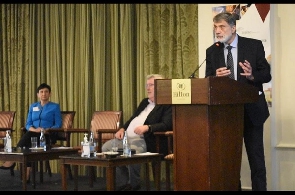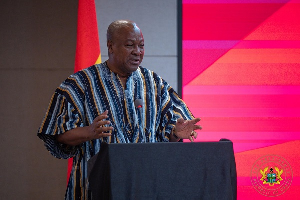Gerhard Erasmus, Professor Emeritus of the Law Faculty at the University of Stellenbosch and founder of Trade Law Center (Tralac), a leading independent think tank has advised implementers of the African Continental Free Trade Agreement and African Governments not to allow the AfCFTA Guided Trade Initiative last too long. He believes that getting several countries trading in a number of limited products but rather ensure that the main achievement of the implementation processes of the AfCFTA is concluded to allow party states themselves to drive the AfCFTA. AfCFTA must be State-Driven and not Guided Trade: Addressing trade experts and Trade Lawyers during the 2022 Tralac Annual Conference in Nairobi, Kenya, Professor Emeritus Gerhard Erasmus, who was significantly involved in the drafting of the South African and Namibian constitutions advised governments of AfCFTA party states to be prepared to own the implementation of the continental trading agreement instead of leaving it to the Secretariat to only guide a few countries and limited products to move across regions. He said admittedly, we do not have the AfCFTA as a comprehensive framework, but once that arrangement is completed, then countries must ensure its implementation without having the secretariat guiding trading across the continent. Professor Emeritus of Law emphasized that the AfCFTA has no executive arm within it and therefore its implementation must be state-driven, explaining that there are three (3) Institutions involved in the agreement; namely the Assembly of the Africa Union which is at the top of the ladder but not as an executive organ of the AfCFTA, then there is the Council of Ministers which is now considered very active and powerful as it is designed to be very power-centered and supported by the committee of Senior Trade Officials and by the AfCFTA Secretariat. “Thus, there are therefore no supernational institutions now for the implementation of the agreement and therefore behooves on party states to drive the implementation of the continental agreement.” He said it is an undeniable fact that “if you put together 54 countries which are at different levels of economic development, you are bound to face a very complicated and challenging task since their needs and interests are different”. But the Law Professor Emeritus argued that the AfCFTA must be party-state-driven once a comprehensive framework of the agreement is concluded in order to celebrate its success. He says for a long time Africa was represented by Sub-Sahara Africa. And gradually the paradigm of continental integration has shifted under the AfCFTA which even makes the agreement more state-driven than ever. “Article 5 of the agreement stipulates that the number one basic principle underpinning the AfCFTA is that it is state-driven”. He stressed. The sovereignty of Nations and Compliance with International Agreements Professor Emeritus Gerhard Erasmus underscored the need for balancing sovereignty with a collective voice in achieving a continental goal. He said the nations treasure their sovereignty for very good reasons including colonization and decolonization which have certainly impaired several processes. “But after the moment of decolonization, we became sovereign and will definitely not sacrifice that sovereignty. Sovereignty is considered a perennial and permanent feature of interaction with one another and for unlocking each other’s potential. In particular, sovereignty is a protection shield for small and poor countries as a consequence of the challenges they face.” “But with sovereignty defined in many different ways, it is part of the WTO charter which reminds the world that, it is part of sovereignty or being sovereign to commit one’s self to collective action and become a party to international agreements and implement those agreements”. He urged that “if it is claimed that it is a shared view that Africa is an entity is confronted with challenges of resilience in dealing with global challenges and adapting policies and improving merit-based bureaucracies in our countries as well as forward-looking trade and educational policies, then states have the responsibilities to implement such policies.” “So, if we now conclude collectively that the AfCFTA is the recipe to lifting millions out of poverty which we at Tralac fully support, we would put the emphasis differently, but we fully support the exercise beyond reproach. However, it is not a self-executing recipe, it’s a member-driven free trade area and only a free trade area”. He emphasized. The Trade Law Professor Emeritus defined a free trade area as the arrangement for liberalizing trade in goods and services because it is comprehensive while retaining policy space for the individual state parties. Professor Emeritus Gerhard Erasmus who has consulted for governments, the private sector, and regional organizations in southern Africa and is currently Associate of Tralac highlighted that from a legal and institutional perspective if you put a number of heads of state in a room with each representing a sovereign state and they take decisions on the basis of consensus and eventually conclude all outstanding instruments to produce a comprehensive AfCFTA, then they and their party states have the responsivity to implement the agreement without resorting to a Guide Trade Initiative for the implementation of such an agreement. The Guide Trade Initiative (GTI) The Secretary General of the AfCFTA Secretariat, H.E. Wamkele Mene announced the AfCFTA Guided Trade Initiative (GTI) during the 9th Meeting of Council of Ministers in July 2022, which sought to kick-start commercially meaningful trade under the AfCFTA regime. The AfCFTA Guide Trade Initiative is a process where the AfCFTA Secretariat and in collaboration with the National AfCFTA Offices guide selected businesses with specific limited products to trade from one party state to another preferably across different regional economic communities in Africa. It is believed that The AfCFTA’s practical implementation solutions and tools such as the Guided Trade Initiative (GTI) can play a crucial role in responding to the current ongoing uncertainty in the international community. This was based on the 7th Meeting of the Council of Ministers (CoM) which adopted the Ministerial Directive 1/2021 on the Application of Provisional Schedules of Tariffs Concessions (PSTC) which was subsequently endorsed by the Assembly of Heads of State and Government in February 2022. According to the AfCFTA Secretariat, the GTI is a solution-based approach to support State Parties that are ready to trade under the AfCFTA which will then serve as a proof of concept to allow the interested group of State Parties to start and sustain the momentum of trading under the preferences of the AfCFTA Agreement. The Secretariat is of the view that the Guided Trade Initiative will demonstrate the efficiency of the legal framework of the AfCFTA instruments; Obtain feedback on the effectiveness of the legal and institutional national systems in the participating countries; Test the readiness of the private sector to participate in trade under the AfCFTA, and identify possible future interventions to increase intra-African trade and maximize the benefits of the AfCFTA. The Initiative initially attracted the interest and participation of seven (7) State Parties – Cameroon, Egypt, Ghana, Kenya, Mauritius, Rwanda, and Tanzania, representing the five regions of Africa. From these countries, a total of over 100 potential traders were realized. These include 14 companies with about 40 trades from Ghana, 27 companies with over 50 trades from Kenya, 7 Companies with 20 trades from Egypt, Mauritius highlighting 25 potential trades, Rwanda with 8 potential trades, and Cameroon with 4 trades under the pilot phase of the initiative. The attractiveness of the Initiative continues to grow as Tunisia for instance has joined the initial seven (7) countries and more and more companies in the participating countries expressing the desire to Trade under the initiative.













